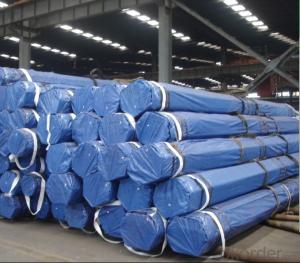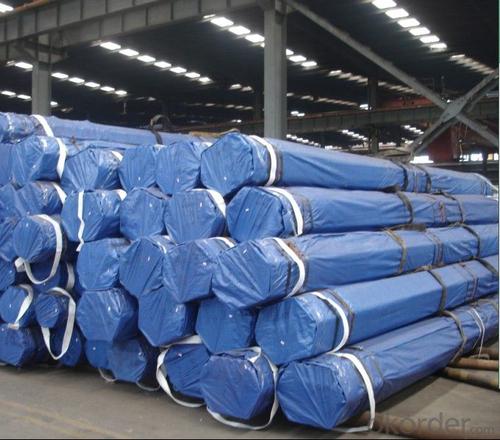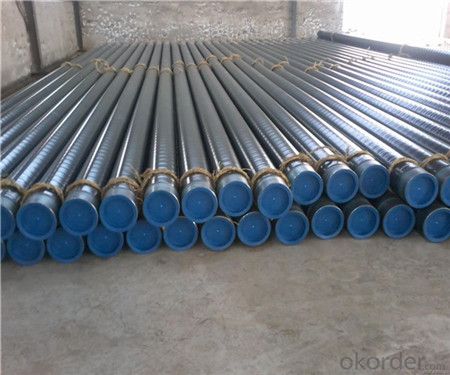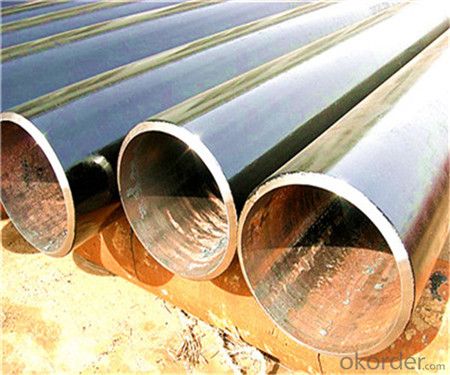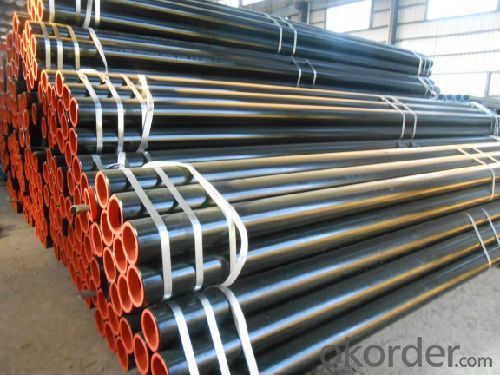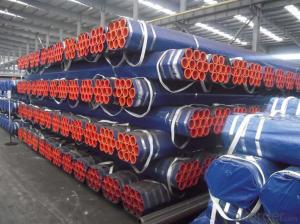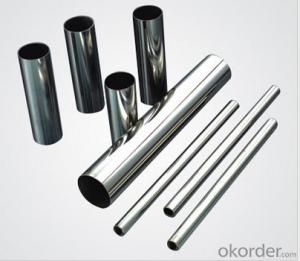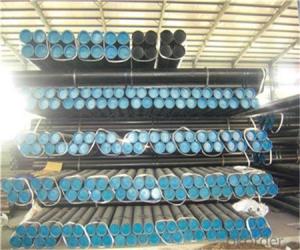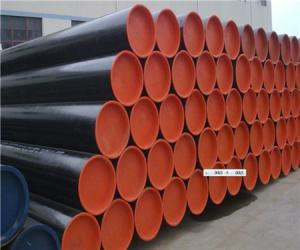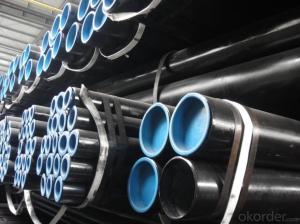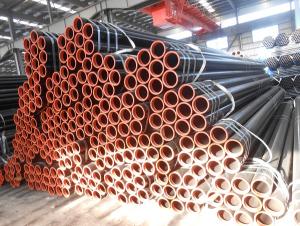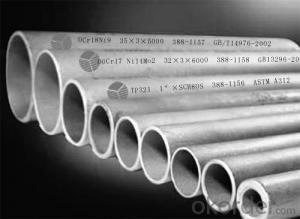Steel Seamless Pipe Mechanical pipe (EN 10297) Supplier
- Loading Port:
- China Main Port
- Payment Terms:
- TT or LC
- Min Order Qty:
- 30 m.t.
- Supply Capability:
- 12000 m.t./month
OKorder Service Pledge
OKorder Financial Service
You Might Also Like
1、Full series of products provides an easier access for one stop purchase
▲ Line pipe
▲ Tubing and casing
▲ L & M & H boiler tube
▲ Gas cylinder tube & pipe
▲ Mechanical & Structural pipe
▲ Ship-building tube & pipe
▲ Automobile tube & pipe
2、Main Features of the Seamless Pipe ASTM A106/53:
• High manufacturing accuracy
• High strength
• Small inertia resistance
• Strong heat dissipation ability
• Good visual effect
• Reasonable price
3、Seamless Pipe ASTM A106/53 Specification:
Standard | GB, DIN, ASTM ASTM A106-2006, ASTM A53-2007 |
Grade | 10#-45#, 16Mn 10#, 20#, 45#, 16Mn |
Thickness | 8 - 33 mm |
Section Shape | Round |
Outer Diameter | 133 - 219 mm |
Place of Origin | Shandong, China (Mainland) |
Secondary Or Not | Non-secondary |
Application | Hydraulic Pipe |
Technique | Cold Drawn |
Certification | API |
Surface Treatment | factory state or painted black |
Special Pipe | API Pipe |
Alloy Or Not | Non-alloy |
Length | 5-12M |
Outer Diameter | 21.3-610mm |
Grade | 20#, 45#, Q345, API J55, API K55, API L80, API N80, API P110, A53B |
Standard | ASME, ASTM |
4、Packaging & Delivery
Packaging Details: | seaworthy package,bundles wrapped with strong steel strip |
Delivery Detail: | 15-30days after received 30%TT |
5、FAQ of Seamless Pipe ASTM A106/53:
Why should you chose us?
● Full series of products provides an easier access for one stop purchase
▲ Electric Resistance Welded (ERW) Steel Pipe
▲ Longitudinal Submerged Arc Welded (LSAW) Steel Pipe
▲ Spiral Submerged Arc Welded (SSAW) Steel Pipe
▲ Hollow Section (Square and Rectangle Pipe)
▲ Hot Dipped Galvanized Steel Pipe
6、Seamless Pipe ASTM A106/53 Images:
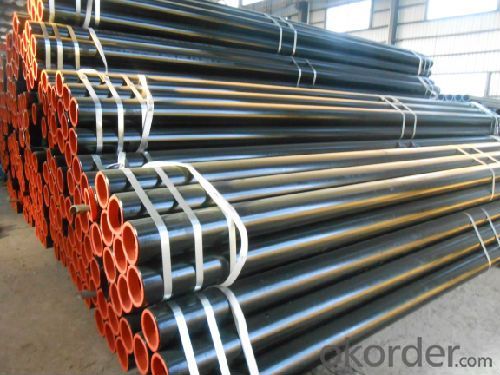
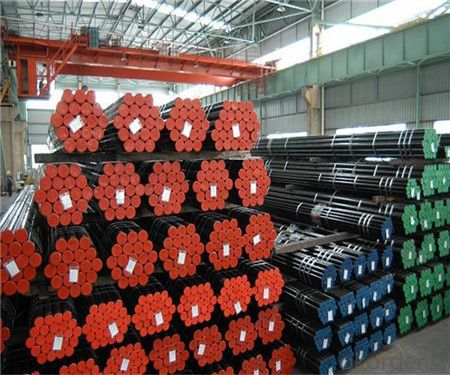
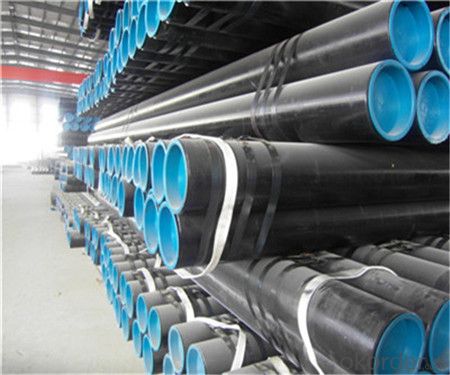
- Q: Can steel pipes be galvanized?
- Yes, steel pipes can be galvanized. Galvanizing is a process of applying a protective zinc coating to steel or iron to prevent corrosion. The steel pipes are submerged in a bath of molten zinc, which forms a metallurgical bond with the steel, creating a corrosion-resistant coating. Galvanizing is commonly used in various applications, such as plumbing, construction, and outdoor structures, to extend the lifespan of steel pipes and prevent rusting.
- Q: How are steel pipes used in the manufacturing industry?
- Steel pipes are commonly used in the manufacturing industry for various purposes such as transporting fluids and gases, providing structural support, and facilitating the flow of materials in industrial processes. They are essential for conveying liquids and gases over long distances or within manufacturing plants, ensuring efficient and reliable transportation. Additionally, steel pipes are utilized in the construction of infrastructure, machinery, and equipment, serving as a robust and durable component. Overall, steel pipes play a crucial role in the manufacturing industry due to their versatility, strength, and ability to withstand high pressure and temperature conditions.
- Q: How do you calculate the pipe head loss for steel pipes?
- The Darcy-Weisbach equation is utilized for calculating the pipe head loss in steel pipes. This equation establishes a connection between the head loss (hL) and various factors such as the flow rate (Q), pipe diameter (D), pipe length (L), fluid density (ρ), fluid velocity (V), and the friction factor (f). The formula can be expressed as: hL = (f * (L/D) * (V^2))/(2g) Where: - The head loss (hL) is measured in meters - The friction factor (f) is dimensionless - The pipe length (L) is measured in meters - The pipe diameter (D) is measured in meters - The fluid velocity (V) is measured in meters per second - The acceleration due to gravity (g) is typically taken as 9.81 m/s^2 The friction factor (f) relies on the Reynolds number (Re) of the flow, which is a dimensionless quantity representing the ratio of inertial forces to viscous forces. The Reynolds number can be calculated using the following equation: Re = (ρ * V * D) / μ Where: - The Reynolds number (Re) is dimensionless - The fluid density (ρ) is measured in kg/m^3 - The fluid velocity (V) is measured in meters per second - The pipe diameter (D) is measured in meters - The dynamic viscosity of the fluid (μ) is measured in Pa·s or N·s/m^2 The friction factor (f) can be obtained from empirical correlations or from Moody's diagram, which establishes a connection between the Reynolds number, the relative roughness of the pipe surface, and the friction factor. By substituting the calculated friction factor (f) and other known values into the Darcy-Weisbach equation, the head loss in the steel pipe can be determined. It is important to note that the head loss represents the energy lost due to friction and other factors and is usually expressed in terms of pressure drop or height difference.
- Q: What are the common materials used for pipe fittings in steel pipes?
- The common materials used for pipe fittings in steel pipes include carbon steel, stainless steel, and alloy steel. Carbon steel pipe fittings are widely used due to their affordability, strength, and durability. They are suitable for various applications, including oil and gas, petrochemical, and water distribution systems. Stainless steel pipe fittings are highly resistant to corrosion and are commonly used in industries that require a high level of hygiene, such as food and beverage and pharmaceutical industries. Alloy steel pipe fittings are composed of multiple elements, such as chromium, nickel, and molybdenum, to enhance their strength and resistance to corrosion. These fittings are often used in high-pressure and high-temperature applications, such as power plants and chemical plants. Overall, the choice of material for pipe fittings in steel pipes depends on the specific requirements of the application and the environment in which they will be used.
- Q: How are steel pipes used in the mining and mineral processing industry?
- Steel pipes are widely used in the mining and mineral processing industry for various applications. They are primarily used for the transportation of water, slurry, and other liquids within the mining operations. These pipes are also used for the conveyance of minerals, ores, and waste materials. Additionally, steel pipes are used in the construction of infrastructure such as mine shafts, pipelines, and underground tunnels in the mining industry. They provide durability, strength, and resistance to corrosion, making them a reliable choice for the demanding conditions of mining and mineral processing.
- Q: How are steel pipes used in the construction of dams?
- Steel pipes are commonly used in the construction of dams for various purposes. They are primarily used for the transportation of water within the dam structure, supplying water to turbines for hydroelectric power generation. Steel pipes are also used for drainage systems, allowing water to be discharged safely and efficiently. In addition, they are utilized for the construction of penstocks, which are large pipes that control the flow of water from the reservoir to the turbines. Overall, steel pipes play a crucial role in the infrastructure of dams, ensuring the efficient management and utilization of water resources.
- Q: Can steel pipes be used for conveying hazardous materials?
- Yes, steel pipes can be used for conveying hazardous materials due to their high strength and resistance to corrosion.
- Q: What are the different grades of steel used in pipe manufacturing?
- There are various grades of steel used in pipe manufacturing, including carbon steel, stainless steel, alloy steel, and high-strength low-alloy (HSLA) steel. Each grade has different characteristics and properties, making them suitable for specific applications and environments.
- Q: What are the safety precautions to consider when working with steel pipes?
- When working with steel pipes, it is important to follow several safety precautions. Firstly, always wear appropriate personal protective equipment (PPE) such as gloves, safety glasses, and steel-toed boots to protect yourself from potential injuries. Additionally, ensure that the work area is well-lit and clear of any obstructions to prevent tripping hazards. It is crucial to use proper lifting techniques or mechanical lifting equipment when handling heavy steel pipes to prevent strains or back injuries. Furthermore, be cautious of sharp edges or burrs on the pipes, as they can cause cuts or punctures. Finally, when working with welding or cutting equipment, make sure to follow proper procedures and wear appropriate flame-resistant clothing to prevent burns or fire hazards. Overall, prioritizing safety measures and being aware of potential risks are essential when working with steel pipes.
- Q: What are the advantages of using steel pipes over other materials like PVC or copper?
- There are several advantages of using steel pipes over other materials like PVC or copper. Firstly, steel pipes have superior strength and durability, making them suitable for high-pressure applications and extreme weather conditions. Secondly, steel pipes have excellent corrosion resistance, ensuring a longer lifespan compared to PVC or copper. Additionally, steel pipes offer better fire resistance, making them safer for certain applications. Lastly, steel pipes have higher thermal conductivity, allowing for efficient heat transfer.
Send your message to us
Steel Seamless Pipe Mechanical pipe (EN 10297) Supplier
- Loading Port:
- China Main Port
- Payment Terms:
- TT or LC
- Min Order Qty:
- 30 m.t.
- Supply Capability:
- 12000 m.t./month
OKorder Service Pledge
OKorder Financial Service
Similar products
Hot products
Hot Searches
Related keywords
